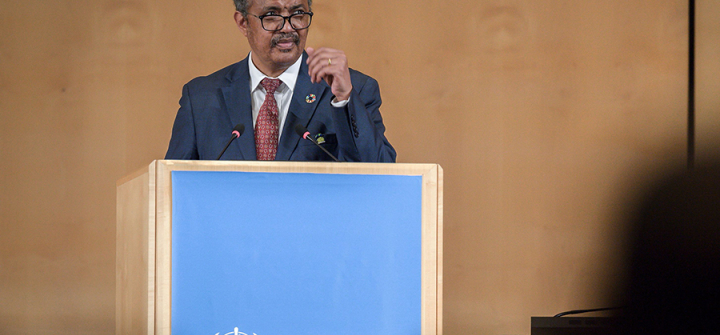Tedros Makes His Case for a Transformed WHO
GENEVA – In today’s opening of the 71st World Health Assembly, WHO Director-General Tedros Adhanom Ghebreyesus made the case for WHO’s relevance and argued forcefully for his strategic vision for the organization’s future.
Tedros also pulled out all the stops, including a moving tribute to WHO’s fallen heroes, inspirational live music, an address by Rwanda’s President Paul Kagame, and a group singalong of Happy Birthday to WHO, which turns 70 this year.
The takeaway from today’s event, however, was of the new DG taking command of his first WHA and making a compelling case to delegates to invest in WHO. He clearly wants to be seen as righting a ship that has been hobbled by insufficient resources and a lack of confidence from member states that prefer to earmark their contributions for specific programs rather than contribute to the organization’s general funds.
“An institution charged with defending the health of 7 billion people … bears great responsibility, and must be held to high standards. You have high expectations of WHO. So you should; so do I,” Tedros said at the beginning of his speech
He was quick to reference the still unfolding Ebola outbreak in the Democratic Republic of the Congo. Referring to his trip there a week ago, Tedros honored the frontline health workers—amazed at their concern for his health rather than their own. He also made a point of saying, “It’s concerning that we now have cases of Ebola in an urban center, but we are much better placed to deal with this outbreak than we were in 2014.”
Tedros listed recent priorities including work on noncommunicable diseases in preparation for this fall’s high-level meeting, a climate change initiative focused on small island states and the Stop TB Partnership. He also emphasized other initiatives against malaria, cervical cancer, and trans fats. And he returned to his central theme of universal health coverage and strengthening health systems—calling out the 33-year difference in life expectancy between some countries.
Central to his argument for WHO was the “fast-tracked” development of WHO’s 13th General Programme of Work, which sets the WHO’s strategic plan for next 5 years. “Its objective is to promote health, keep the world safe, and serve the vulnerable,” he said. “This is our shared sense of purpose. This is the goal to which we all subscribe.”
Tedros emphasized its ambitious goals and invoked the successful global campaign to eradicate smallpox as evidence of the kind of impact that WHO can have. “This is what WHO is capable of. This is an organization that can change the course of history,” he said. “And we are still changing history, every day.”
As evidence he cited WHO and its partners’ work against cholera in Yemen and their success in quashing plague in Madagascar with 1.2 million doses of antibiotics and $1.5 million in emergency funds. He also cited the organization’s response to 50 emergencies in 47 countries and territories in the past year alone.
To close the deal, Tedros listed 3 priorities essential to success: A more muscular, transformed WHO that’s more efficient and effective; political commitment from global leaders; and more partnerships with outside organizations.
Ed Notes: See the latest news from #WHA71 here.
Want to share a #WHA71 tip or a story idea? Want to connect with GHN editor-in-chief Brian Simpson in Geneva? Please be in touch.
Join the tens of thousands of subscribers who rely on Global Health NOW summaries and exclusive articles for the latest public health news. Sign up for our free weekday enewsletter, and please share the link with friends and colleagues: Subscribe to GHN
World Health Organization (WHO) Director-General Tedros Adhanom Ghebreyesus delivers a speech on the opening day of the World Health Assembly, an annual meeting with health representatives, May 21, 2018. FABRICE COFFRINI/AFP/Getty Images





